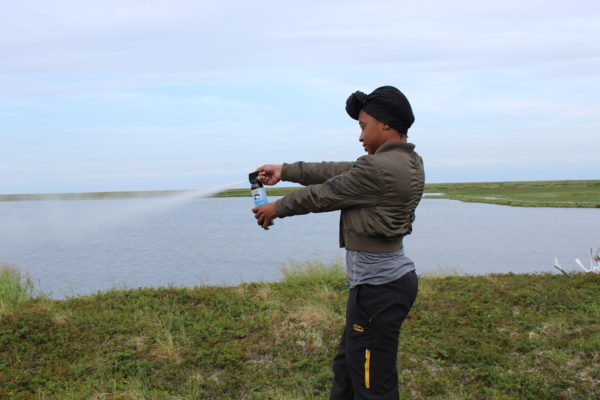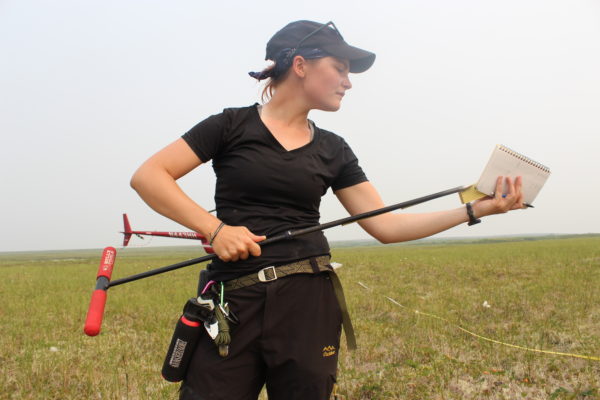(Mark Paricio is a PolarTREC Teacher accompanying the Polaris Project this summer. To read all of Mark’s journals, go to: http://www.polartrec.com/expeditions/siberian-arctic-systems-study )
Polaris Project Student Research – Eric Taber (Colgate College) and Sam Berman (Clark University)
To me as a teacher, one of the most rewarding aspects of the Polaris Program is watching mentoring relationships develop between students and researchers from the same university. Taking education out of the confines of the university and into the field, raises the level of thinking and problem solving beyond what can be accomplished in traditional settings.
The empowerment and inspiration that students receive from working with these remarkably high caliber (and caring) professional researchers as undergraduates, will change the way students view their education and their career aspirations.
Two such relationships that I have watched grow over the last four weeks are featured in this journal.
Eric Taber (Colgate College) and Dr. Mike Loranty (Advisor)
Eric Taber is a tremendously bright young man who will be a senior this coming year at Colgate. Of equal importance, Eric is the first person to volunteer to help when someone needs an extra hand – all in all, he is truly a good guy!
Eric’s advisor here has been Dr. Mike Loranty, who will be new to the faculty at Colgate this coming fall.
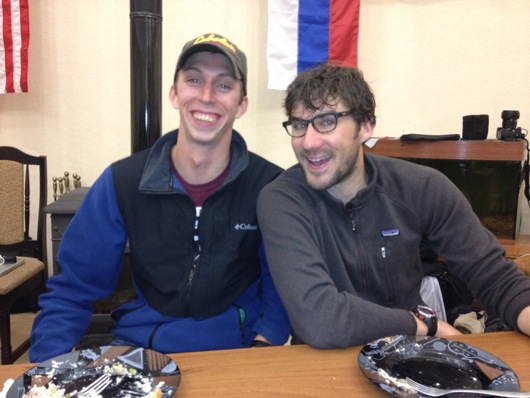
Eric Taber and Dr. Mike Loranty of Colgate share a meal and a smile after Eric’s research presentation.
Over the past weeks, Eric and Mike have worked together in the field and have shared numerous discussions about Eric’s own research project on how vegetation types in the boreal forests control the flux (release) of carbon into the atmosphere. This research involves using traditional methods of determining both thaw depth and soil moisture around different types of vegetation, specifically lichen, mosses, and shrubs, as these parameters directly affect the carbon flux. Additionally, Eric has worked to correlate the electrical resistivity of soils to the moisture content and thaw depth as a way to understand the carbon flux of mixed systems.
In these areas, Mike has been an invaluable resource to Eric. Additionally, Eric has been an enormous asset to Mike’s fieldwork.
This is actually Eric’s second summer he has participated in a summer research experience. Last summer, he spent two months in Costa Rica. Eric plans to pursue a graduate degree in environmental sciences and environmental policy.
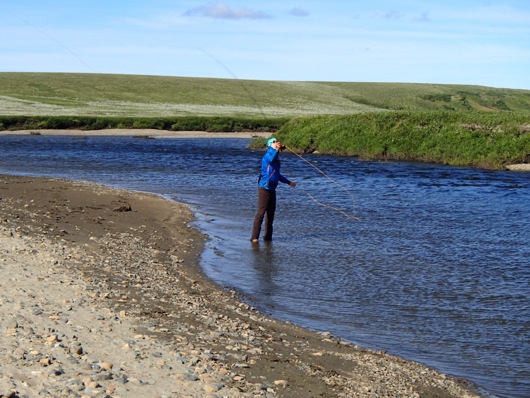
Eric Taber fly fishes on the Arctic tundra. He caught half a dozen fish in an hour!
Sam Berman (Clark University) and Dr. Karen Frey (Advisor)
I may owe Sam Berman of Clark University my life, as he skillfully shuttled our inflatable boat from the tundra back to the barge in 30 mile per hour winds and white caps the other day. Maybe I am exaggerating about my life, but I definitely owe him my gratitude as this is way outside my skill set. He is truly quite a sailor!
During these last weeks, Sam has worked under the guidance of Dr. Karen Frey, also of Clark University. I have been fortunate to watch their interactions both on the waters of Shuch’ye Lake where Sam has conducted half of his research, involved in determining the variability of chlorophyll biomass in the different types of lakes in the Kolyma River basin. This has involved not only learning how to use sampling instruments on the lakes but learning how to process laboratory samples and how to deal with data as well. Sam will be a junior in Earth System Science
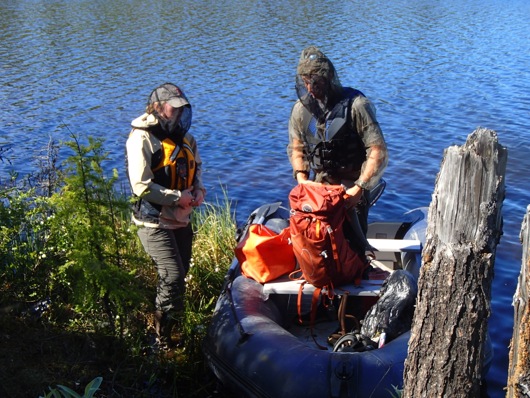
Sam and Dr. Karen Frey discuss the logistics involved with packing the inflatable raft with sampling equipment.

Karen gives Sam some suggestions on his research presentation.
Last Words on Mentoring
Another group of unsung but extremely valuable mentors to the undergraduate students are the two graduate students here, Dave Mayer of Clark University and Travis Drake of the University of Colorado. Though they work their own projects, they always seem to be available to the undergraduates. Other scientists of the Woods Hole Research Center including Logan Berner, Kate Bulygina, and Scott Zolkos have spent dozens of hours conferring with the undergraduates as well.
One intangible in the mentoring relationships that have developed here is simply the bond that forms when people do lab work together at 2:00 a.m. and carry field equipment or (boats!) through swarms of mosquitoes where no roads exist. I definitely have appreciated these relationships
Stay curious my friends! – Mark Paricio


